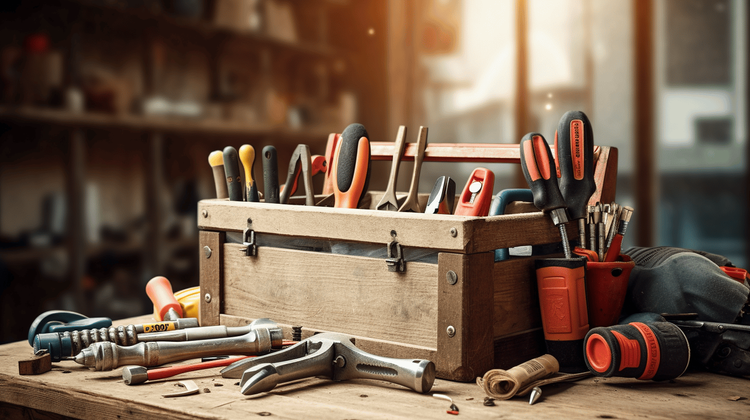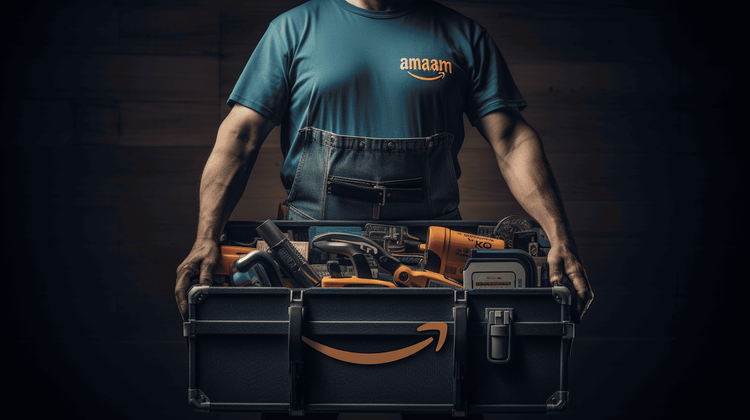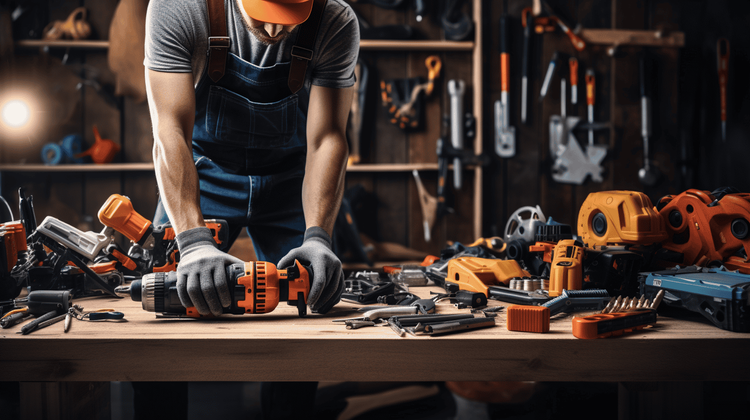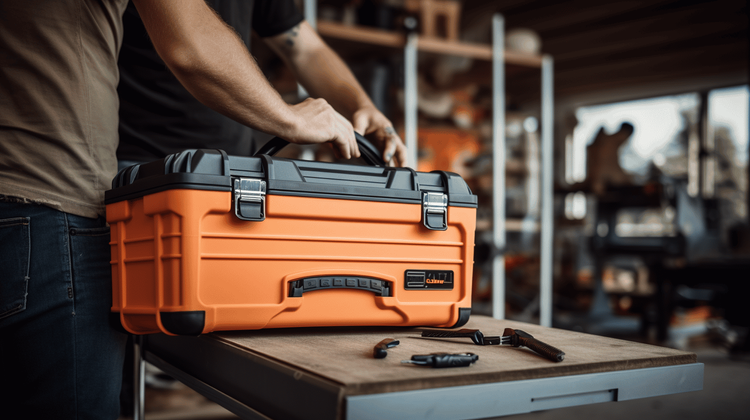Bring Your DIY Dreams to Life: Economical Tool Recommendations
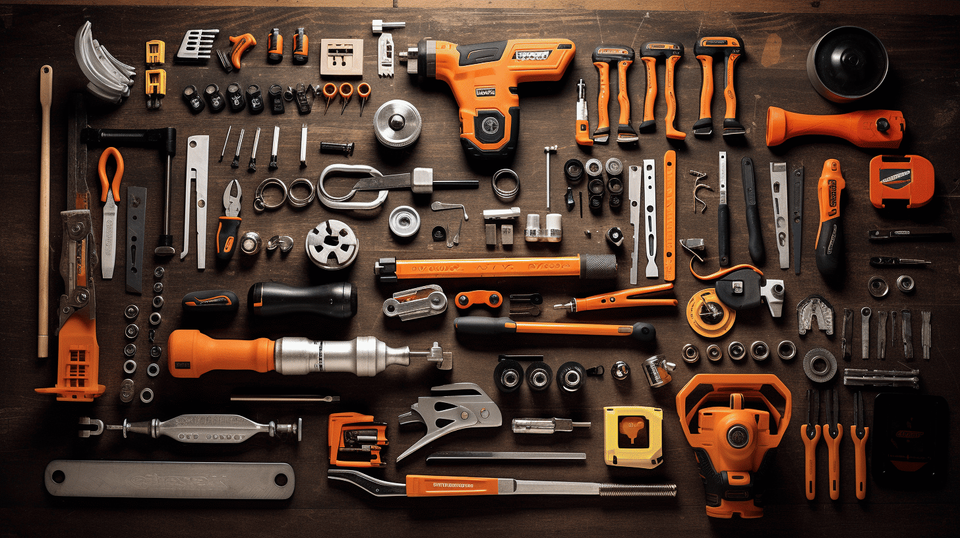
Diving headfirst into a fresh DIY project feels exhilarating, especially when you have the liberty to not just assemble parts together, but to bring a concept to life from scratch! Your sentiments and efforts get poured into the contours of that piece, making it distinctive and special. Whether you're looking to hand-make a gift, personalize your living space or discover a new hobby, a well-stocked toolkit can unlock a world of creative possibilities.
But let's face it - delving into the land of wood chips and carpenter's glue can feel quite overwhelming, especially when standing in front of an endless aisle of DIY tools. Fear not! This article is created just for you! We are about to demystify the world of DIY tools, explaining why each tool is essential and offering economical recommendations suited for your budget.
Get ready to wrap your hands around some intriguing DIY possibilities because we're about to journey beyond the traditional "hammer and nail" thinking into a world teeming with innovative tools and exciting new ideas! 😃
Understanding DIY and its Benefits
Welcome to the incredibly empowering world of 'Do It Yourself' or DIY. This go-getter practice is all about diving into the depths of a project with your own hands, steering away from relying on professionals. Not just a mere hobby, this is a lifestyle choice for many. The beauty of DIY lies in its accessibility - no matter who you are, or where you're from, you can take advantage of its numerous benefits. Here, let's dive into the ocean of DIY and its many rewards.
Financial Savings
Shelling out hard-earned cash for simple repairs or decorations can feel like a punch in the gut. Here's where DIY swoops in to save the day, and your wallet. It's a reality, DIY helps save money by eliminating the need for professional services. With the right tools and some research, you can tackle many household projects yourself. Not only does this translate to significant financial savings but the sense of accomplishment makes it all the sweeter.🏠💰
Customization and Personalization
One of the main perks of DIY is the ability it gives you to tailor-make items to perfectly suit your needs and aesthetics. Allows control over the project's design and details. You can let your creative juices flow, constructing unique pieces that reflect your personality and add a personal touch to your space. Be it a piece of furniture, a restored thrift find, or a whimsical wall decoration, when you do it yourself, you dictate the design.👌🎨
Learning New Skills and Hobbies
Life is a never-ending learning journey and DIY can be an enriching pit stop on that route. No task is too small or too ordinary. Every DIY project, whether mending a leaky tap or painting a canvas, teaches you something new. Along the way, DIY provides an opportunity to learn new skills and turn them into hobbies. The best part? Many of these DIY skills can then be used for other projects, making you an ever-adaptable, always-equipped DIY dynamo.🔧🎓
Now that you're equipped with the knowledge, it's time to dive headfirst into that DIY project you've been dreaming about! After all, Theodore Roosevelt was right when he said, "Do what you can, with what you have, where you are."👍✨
Essential Tools for DIY Activities
There's a certain satisfaction in creating something with your own two hands--a sense of fulfillment that can't be rivaled. Embarking upon DIY projects lends you not just this joy, but also a fantastic opportunity to learn new skills and save money. However, for these endeavors, having the right equipment is key. And that's where we step in, to guide you through the essential tools for DIY activities.
Basic Hand Tools
The foundation of any budding DIY enthusiast's tool collection is the basic hand tools. These are the tools that allow you to take on the most basic DIY tasks, from hanging pictures to assembling flat-pack furniture.
- Hammer: Every DIY-er needs a reliable hammer. Perfect for nails, but also useful when you need a bit of brute force.
- Screwdrivers: For all your screwing and unscrewing necessities, a good set of screwdrivers ─ both flat-head and Phillips ─ is vital.
- Rulers: A folding ruler is an invaluable tool for accurate measurements, where precision can often be the difference between success and failure.
"Remember, there's no such thing as too much preparation. Measure twice, cut once." That’s an age-old adage every DIY enthusiast should live by!
Essential Power Tools
Though hand tools are indispensable, the true magic of DIY comes alive with power tools. These can speed up your projects significantly, and make manual tasks a breeze.
The power drill, with its ability to both drill holes and drive screws, is arguably the most versatile power tool in any DIY kit. It can handle a variety of tasks, from hanging shelves to building outdoor decks. A circular saw, on the other hand, is ideal for cutting wood and can be a real time-saver.
Cordless versions of these tools are increasingly popular for their convenience and portability, especially if your project area is away from a power point or you prefer the flexibility of moving around freely.
Safety Gear
Last but certainly not least, every DIY-er needs to invest in the proper safety gear. This isn't just about being cautious - it's about making sure you can continue doing what you love. Here are some basics you'll need:
- Safety Glasses: These will protect your eyes from flying debris.
- Ear Protection: Power tools can be loud, and prolonged exposure can cause permanent damage to your hearing.
- Work Gloves: Perfect for protecting your hands from blisters, cuts, and splinters.
DIY projects are as exciting as they are rewarding, but also demand respect for the process and the tools involved. Always remember, safety comes first. With these tools in your kit, you're set up for a fulfilling, and, more importantly, safe DIY journey!
Economical Tool Recommendations
Whether you're a DIY enthusiast or a seasoned professional, you need to have reliable tools that won't break the bank. In this section, we are going to dive into some economical tool recommendations. Let's niggle into your toolbox and find the most essential and cost-effective toolkit goodies.
Hand Tools
Every toolbox should start with a collection of basic hand tools. These are the ultimate helpers for small, quick-fix jobs, and they don't need to burn a hole in your pocket.
:hammer_and_wrench: Hammer: A good quality claw hammer can help you with a range of tasks from hammering nails to minor demolition jobs. An entry-level hammer that doesn't compromise on quality can be found for less than 10 dollars.
:wrench: Adjustable Wrench: This versatile tool can be adjusted to fit a multitude of nuts and bolts. Its utility in both plumbing and assembling furniture makes this a must-have. Look for a sturdy design with a comfy grip!
:scissors: Scissors: A quality pair of scissors is another tool box essential. Going for one that’s both budget-friendly and will give you a neat cut is key.
Remember, while these tools might seem simple, investing in good quality pieces can save you from buying replacements frequently.
Power Tools
If you're up for more advanced tasks around the house, power tools should be your go-to. While these can be more expensive than hand tools, there are still affordable, high-quality options available.
:drill: Cordless Drill: This is likely the most versatile power tool. An important tip while going for an economical one is to focus on power and battery life rather than added features.
:saw: Circular Saw: Ideal for cutting large pieces of wood or boards. Buying a corded model instead of a cordless one can help you save money without compromising on power.
Remember, while these tools have a bit of a learning curve, they can be extremely valuable for a wide range of tasks.
Safety Gear
No toolbox is complete without some basic safety gear. After all, no job is worth risking your well-being!
:goggles: Safety Goggles: An absolute must if you're working with tools that create dust or debris. Luckily, a good pair of safety goggles is not likely to cost more than a few dollars.
:gloves: Work Gloves: Protect your hands when doing heavy work with a sturdy pair of gloves. Cut-resistant variants provide the best durability and protection.
:helmet: Hard Hat: It might seem overkill for some DIY tasks, but better safe than sorry! And with economical options available, it's worth the small investment for high-risk activities.
Stay safe, and enjoy the satisfaction that comes with DIY projects or professional work, while also being mindful of your budget, with these economical tool recommendations!
Guide to Tool Maintenance
A good set of tools is a long-term investment that more than pays for itself in the long run. But what's the secret to making your tools last? The simple answer is - regular and proper tool maintenance. By cleaning your tools, storing them correctly, and conducting regular check-ups, you can ensure they remain in tip-top shape for years to come. Let's dig a little deeper into these three crucial aspects of tool maintenance.
Cleaning Your Tools 😷
Regular cleaning is no less vital for your tools than it is for your personal hygiene. On average, tools that are regularly cleaned have a considerably longer lifespan than those that are not. It prevents the accumulation of dirt and grime that can decrease the tool's effectiveness or even lead to mechanical issues over time.
To clean your tools:
- Wipe them down after each use to remove any dust or debris.
- Deep clean them periodically with a suitable cleaning solution.
- Dry your tools thoroughly after each clean to prevent any rust or corrosion.
Remember, you're not only prolonging the life of your tools but also ensuring their performance remains at its peak with regular cleansing.
Proper Storage is Key 🔐
To err on the side of caution and sidestep preventable damage to your tools such as rust, invest in appropriate storage. Whether it's a toolbox, a workbench drawer, or wall-mounted storage, safeguarding your tools from harsh elements and environment is crucial.
Keep these points in mind for efficient storage:
- Store tools individually if possible, to avoid unnecessary contact and potential damage.
- Keep them dry to prevent rust.
- Store power tools with their parts detached, to enhance their durability.
Storage does more than just keeping your tools organized; it's an effective line of defense against premature wear and tears.
Schedule Regular Check-ups 🔍
Much like you schedule your health check-ups, your tools too need regular inspections. Timely identification of any signs of damage or wear can increase the tool's lifespan and maintain optimal performance.
To conduct a successful check-up:
- Inspect your tools regularly - don’t wait for a malfunction before you examine them.
- Look out for rust or corrosion, the silent killers of your tool’s lifespan.
- Catch early signs of wear, like a loose handle or wobbly parts, and repair them immediately.
Routine check-ups are more than just a cursory glance at your toolset; they're an important aspect of proactive tool maintenance that can save you time, money, and frustration in the long run.
Taking care of your tools might seem like a chore, but with these steps in mind, it becomes a standard routine. Invest in your tools, and they’ll return the favor tenfold!
Conclusion
Embracing the DIY lifestyle is about more than just learning new skills or hobbies. It's about experiencing the joy of creating something with your own two hands. It's about the satisfaction of knowing you've personalized your environment to suit your taste and needs. It's an adventure in exploring the limits of what you can do.
But every adventurer needs the right gear. From basic hand tools to powerful power tools, understanding the tools of the trade is a vital step in your DIY journey. The savviest DIY enthusiasts know that quality matters, and investing in economical, but high-performing tools like those available on Ultra Handy will pay off in the long run. They not only make tasks easier but also ensure safety and longevity.
One unsung DIY hero is the Bit Holder Keychain. Convenient, portable, and incredibly handy, it keeps your screwdriver bits organized and easily accessible, an essential for any serious DIYer.
As you continue on your DIY adventure, always make sure to maintain your tools effectively. Remember, a clean tool is a safe tool, and a well-stored tool is a long-lasting tool.
And remember, the adventure doesn't end here. Keep exploring, keep creating and most importantly, keep learning. Because every creation, big or small, is a testament to your creativity and resourcefulness. Happy DIY-ing!
Frequently Asked Questions
- What are some economical DIY tools for beginners?Some economical DIY tools for beginners include: 1. A basic toolset that includes a hammer, screwdriver set, pliers, and tape measure. 2. A cordless drill with a set of drill bits. 3. A utility knife. 4. A level. 5. A set of wrenches.
- Are cheap DIY tools durable enough?While cheap DIY tools may not have the same level of durability as higher-end tools, they can still serve beginners well for basic DIY projects. It's important to balance your budget with your project needs and invest in tools that are suitable for the tasks you plan to undertake.
- Where can I find affordable DIY tools?You can find affordable DIY tools at various places such as local hardware stores, home improvement centers, online marketplaces like Amazon or eBay, and even thrift stores. Keep an eye out for seasonal sales, clearance offers, or discounts to get better deals.
- Should I buy power tools or stick to hand tools?The choice between power tools and hand tools depends on the type of projects you intend to work on. Power tools are ideal for tasks that require speed and efficiency, while hand tools are suitable for smaller, precise projects. Consider the complexity of your DIY projects and invest accordingly.
- Can I rent DIY tools instead of buying them?Yes, renting DIY tools can be a cost-effective option, especially if you only need them for a specific project. Many local hardware stores offer tool rental services. However, if you frequently undertake DIY projects, owning a set of tools may be more economical in the long run.
